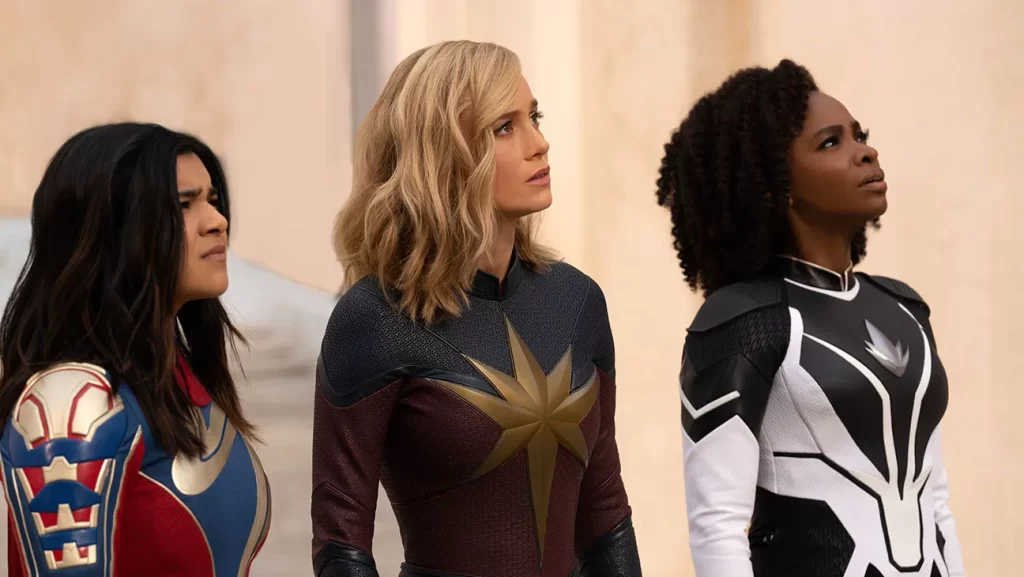
The title of The Marvels doesn’t appear on screen until the end, but it’s announced verbally midway through, during a cutesy scene where the three main characters debate potential nicknames for their improbable team-up. It’s easy to condemn such dialogue as unduly meta, but the problem with The Marvels isn’t the Marvels; it’s Marvel, singular. On its own terms, this movie exhibits its fair share of appealing qualities: charming actors, playful humor, a generally buoyant tone. But it can’t really exist on its own terms—not when it’s constantly being pulled into the yawning black hole that is the Marvel Cinematic Universe.
This is partly a matter of laborious franchise integration. Multiplex attendees have long since accepted the term “threequel,” but logistically speaking, The Marvels is essentially a triple-sequel, providing a conjoined follow-up for its three disparate members. Most obviously, it operates as a successor to Captain Marvel, the 2019 smash hit that introduced Carol Danvers (Brie Larson) as the final piece of the superhero puzzle before the studio delivered the ultimate crossover event with Avengers: Endgame. That behemoth may have concluded with a sense of nominal finality, but while it said goodbye to several of the series’ biggest stars (most notably Robert Downey Jr.’s Iron Man and Chris Evans’ Captain America), it hardly turned off the corporation’s lights; there have since been eleven additional feature installments, along with quite a few TV series—two of which factor in here. WandaVision introduced Monica Rambeau (Teyonah Parris), the daughter of Carol’s old friend Maria (who also appeared in Captain Marvel, which actually took place in the ’90s and, look, just go with it); Monica acquired her own superpowers when she waltzed through the force field that was trapping Wanda Maximoff in the fabricated town of Westview, and she now serves as a galactic sentry for Nick Fury (Samuel L. Jackson). And then there is Kamala Khan (Iman Vellani), the New Jersey teenager who morphed into Ms. Marvel on the show of the same name, and who has long nurtured a celebrity crush on one Captain Marvel.
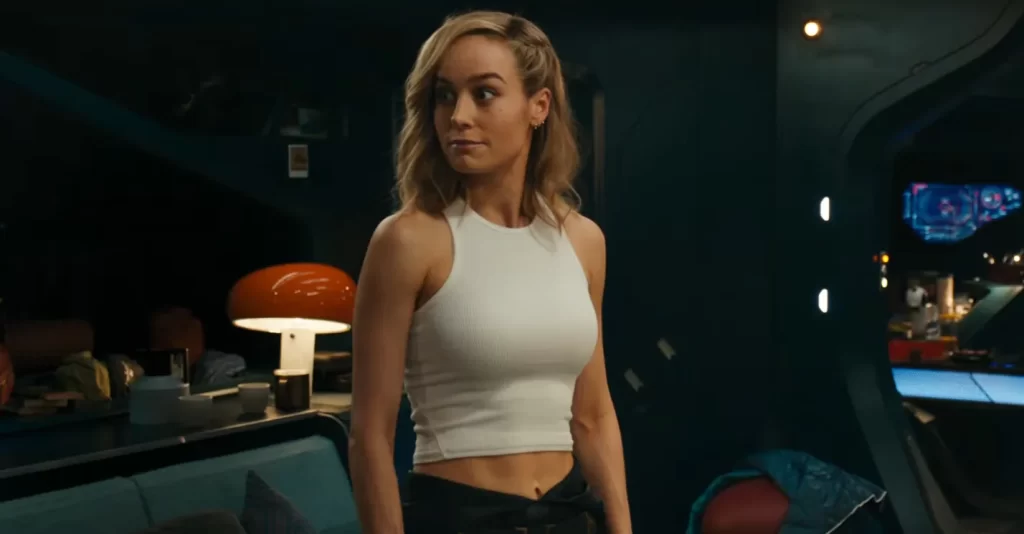
Got all that? Honestly, don’t worry about it. The director Nia DaCosta (Candyman), who wrote the screenplay with Megan McDonnell and Elissa Karasik, does an admirable job of brushing past all of this preexisting lore with nonchalant efficiency, ensuring that you don’t need a doctorate in MCU Studies to follow the story. (Kamala’s backstory is sketched in via a colorful animated sequence akin to a “previously on” recap, while Monica relays her quasi-origin story through blunt dialogue implying she’d rather not talk about it.) And once you process everyone’s connections, The Marvels proves to be a relatively standalone comic-book adventure. Sure, there are the obligatory nods to past and future MCU entries—Tessa Thompson flits in for a cameo, while multiple post-credit stingers introduce new/old heroes and tease subsequent collaborations—but DaCosta avoids the crippling bloat that afflicts so many modern costumed outings.
I wish I could say she also avoided hewing to the MCU’s house style and instead imbued the movie with her own artistic personality. Alas, The Marvels suffers from the usual aesthetic and narrative flaws: Its villain is tedious, its action is enervating, and its plot is perfunctory. It’s a pretty average superhero picture, only in an era where “average” has crept steadily downward.
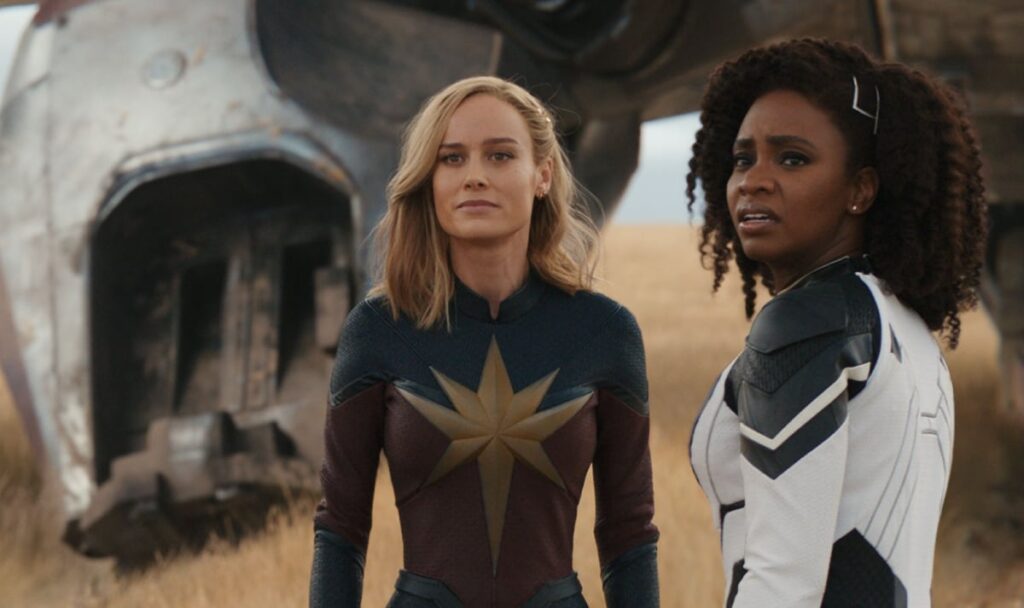
One issue with The Marvels is that its strengths—chief among them the winning chemistry between its three leads—are relatively small-scale, meaning they’re dwarfed by the film’s lugubrious claim to putative stakes. Once again, entire planets are imperiled, this time thanks to a glowering baddie named Dar-Benn (Zawe Ashton, from Velvet Buzzsaw), one of those armored warriors with angry eyes and a hammer so big it would make Thor envious. She appears to have a personal vendetta against Captain Marvel, whom she calls The Annihilator, and she proceeds to wield a mythical Quantum Band to… you know what, forget it, it’s not worth it. The complicated plots in MCU movies are secretly beside the point; they’re just an excuse for the characters to interact, and for directors to raid Marvel’s vast resources and harness them into creative filmmaking.
That’s the theory; in practice, most MCU action scenes are monotonous and unimaginative. Sadly, The Marvels fares no better. To her credit, DaCosta and her writers have devised a gimmick that at least attempts to infuse the franchise’s typically dull set pieces with a measure of innovation: Whenever any of the titular heroes uses her powers, she swaps places with one of the other women, even if they’re located on different worlds. This yields some fun jolts of surprise, which the actors articulate gracefully. The problem is that the characters’ “light-based” powers are too similar and generic for the switching to generate any pictorial vividness; it mostly just results in a lot of shrieking and hand-waving. (Now if Black Widow and the Hulk suddenly traded places, that would be memorable.)
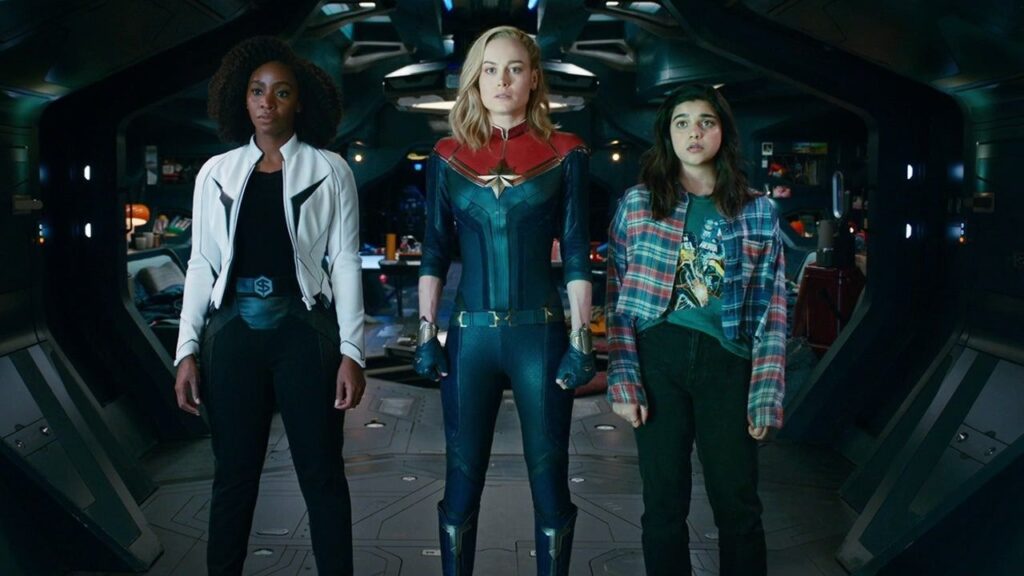
Over time, DaCosta eases up on the random teleportations and restores The Marvels to a more standard regimen of superhero combat—beams of light, weightless CGI flying, obvious green screens. You’d think that I would eventually grow to accept the humdrum quality of the MCU’s senseless sound and fury, but it remains the franchise’s most maddening visual tic. The movie’s second half contains far too many scenes of ostensibly omnipotent figures blasting bolts of energy toward one another, a tiresome ritual that’s bereft of the mass and clarity required for engaging cinematic action.
It’s a bummer. Still, if The Marvels fails as a showstopper, it succeeds as an easygoing buddy comedy. The dialogue can verge on bantery, but plenty of jokes land, and the actors evince genuine warmth, most notably Vellani. Kamala’s obsession with Captain Marvel might have played as repetitive on the page, but Vellani conveys the teen’s starstruck admiration with variety and wit, while also supplying a broader enthusiasm that’s infectious rather than annoying. Even as the MCU’s financial fortunes dwindle, it may have just produced its first new star.
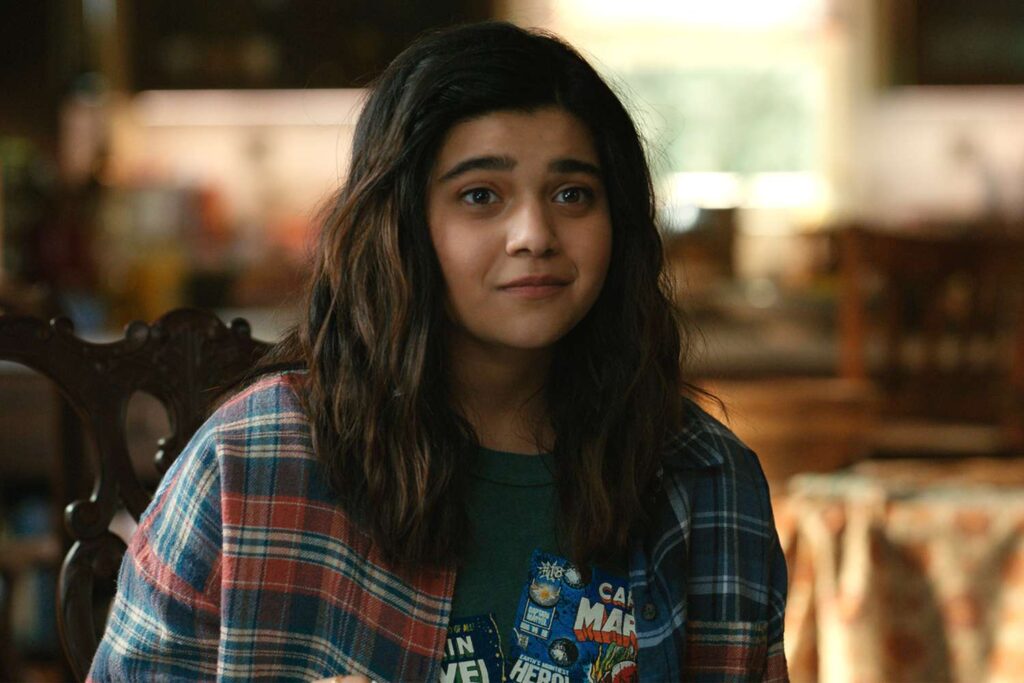
And when The Marvels isn’t preoccupied with saving the galaxy, it delivers a few lively sequences that hum with legitimate inspiration. A montage in which our heroic trio practices suppressing their chaotic body-switching—complete with juggling and jump-roping—is edited with rhythm and snap. Later, the famous cat from Captain Marvel returns, now with adorable and voracious kittens in tow, resulting in what is surely the most original on-screen application of the song “Memory.” The obvious highlight is a visit to an oceanic planet where the citizenry communicate exclusively through song, at which point this by-the-numbers superhero flick transforms into a colorful, dazzling musical. It’s delightful.
Would a proper Marvel musical be too much to ask for? Probably. The MCU’s commercial dominance may be shrinking, but for the time being this remains a cautious and controlled universe, with little room for true experimentation. The Marvels is a pretty good comedy and a pretty bad action movie that unfortunately focuses too heavily on the latter at the expense of the former—a familiar misalignment that’s growing endemic and perhaps fatal to the franchise. But really, how hard would it be for the MCU to start making dialogue-driven hangout movies with snippets of world-saving mayhem, rather than the reverse? After all, if The Marvels proves one thing, it’s that it’s easy for superheroes to switch places.
Grade: C+
Jeremy Beck is the editor-in-chief of MovieManifesto. He watches more movies and television than he probably should.
